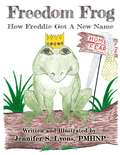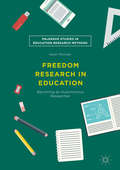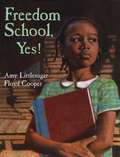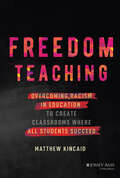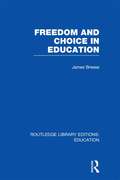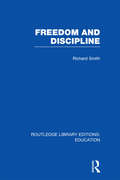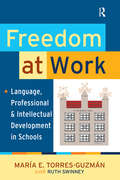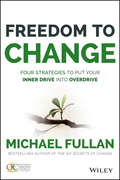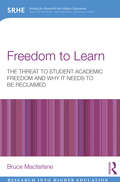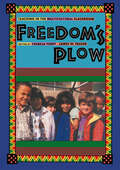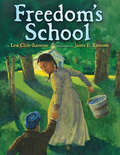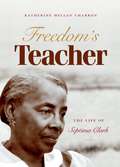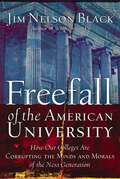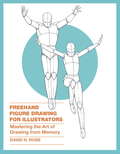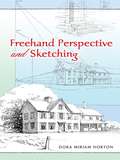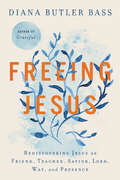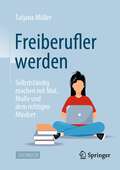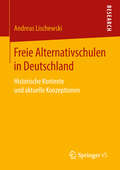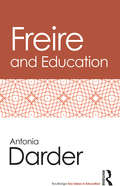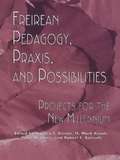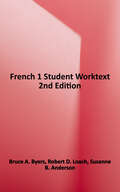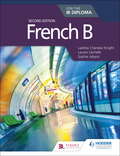- Table View
- List View
Freedom Frog: How Freddie Got a New Name.
by Jennifer LyonsFreedom Frog is an uplifting, cheerful story written to help shed some light in the darkness of a child’s world that is filled with obstacles, difficult trials, and of course bullies.Sharing this story with your child will not only help your child grow in the understanding of bullying but will also help them to gain some valuable insight on how to handle difficult situations in life through the power of prayer and standing on the Word of God.It is my hope that reading this book will encourage children everywhere to stand on God’s promises and stand strong in the face of bullies.This story takes place in a remote setting, in a small community of creatures where Freddie Fro Fearful Frog lives. Along with all his friends, Freddie is oppressed by a slippery, slithering, sinister snake named Sergio Sir Slippery Snake.I hope you enjoy reading how Freddie gets his new name.
Freedom Research in Education: Becoming An Autonomous Educational Researcher (Palgrave Studies in Education Research Methods)
by Karen McArdleThis book sets out a new and distinctive means of conceptualising research in the field of Education: ‘Freedom Research’. Freedom research is a conceptual understanding of research free from the strictures of orthodoxy; which adapts or knowingly critiques conventions about the ways in which research should be conducted. Underpinning this concept is the argument that the conventions of traditional approaches to research in education may be both confidence-sapping and constrictive to both the early career and mature educational researcher. By critiquing the boundaries of a socially constructed discipline, the researcher may then be liberated to research with freedom, creativity and innovation. This pioneering volume will assist the researcher to become more autonomous, and by extension more confident, in their own research practice. It will be of appeal to scholars, students and researchers in Education, of all stages of their career.
Freedom School, Yes!
by Amy LittlesugarWhen their house is attacked because her mother volunteered to take in the young white woman who has come to teach black children at the Freedom School, Jolie is afraid, but she overcomes her fear after learning the value of education.
Freedom Teaching: Overcoming Racism in Education to Create Classrooms Where All Students Succeed
by Matthew KincaidBuild an anti-racist and culturally responsive school environment In Freedom Teaching, educator and distinguished anti-racism practitioner Matthew Kincaid delivers a one-stop resource for educators and educational leaders seeking to improve equity and increase the cultural responsiveness of their school. In this book, you’ll discover the meaning and fundamentals of anti-racist education and find a roadmap to reducing the impact of systemic racism in your classroom. The author offers skills and tools he’s developed over the course of his lengthy career teaching anti-racist ideas to educators, providing readers with strategies that are effective at both the individual teacher and collective school community level. Readers will also find: ● A thorough introduction to the idea of Freedom Teaching and creating an education system that works for all students ● Strategies for building and maintaining anti-racist schools and classrooms ● Important social justice lessons from unsung activists An indispensable resource for educators, educational leaders, and anyone who wants to actualize change in our education system, Freedom Teachingbelongs in the libraries of the parents and families of students and teachers in training hoping for a better understanding on anti-racist concepts and ideas.
Freedom and Choice in Education (Routledge Library Editions: Education)
by James BreeseMuch of the material included here owes it inspiration to discussions held with groups of student teachers in the early 1970s. The book is written for such students and discusses issues such as the acquisition of knowledge, the value of examinations, dependency and religion in education. The book is intended as a thought provoker – to stimulate further discussion.
Freedom and Discipline (Routledge Library Editions: Education)
by Richard SmithQuestions of discipline and order arise wherever formal education is practised, and are particularly acute for those training to teach or in their first school posts. For many years now writing on these topics has tended to depict teaching as the deployment of ‘skills’ and ‘techniques’ and competent teachers as those who successfully ‘manage’ their classes. This approach is criticised by Richard Smith as manipulative and destructive of the kind of pupil-teacher relationship conducive to any but the most trivial sorts of learning. Thus the philosophical issues which the book explores are shown throughout to have their roots in problems associated with established thinking and practice, and the author’s ideas have considerable practical relevance. He argues for a thorough reappraisal of the nature and basis of the teacher’s authority and demonstrates the importance of a proper understanding of the function of punishment. He suggests that many of the problems of discipline that teachers meet may actually stem from inappropriate ways of treating pupils, and shows that solutions to these problems must be compatible with the degree of initiative and personal responsibility that it is the business of education to foster. Schools have changed in many ways, largely for the better, since the first edition of this book appeared: the young people in them are generally treated with far more respect than was the case a quarter of a century ago. The voices of a more repressive tradition however still make themselves heard from time to time. It is therefore important continually to re-state the principles on which civilised relationships between pupils and teachers need to be based.
Freedom and School Choice in American Education
by C. Bradley Thompson Greg ForsterLeading intellectual figures in the school reform movement, all of them favoring approaches centered around the value of competition and choice, outline different visions for the goal of choice-oriented educational reform and the best means for achieving it. This volume takes the reader inside the movement to empower parents with choice, airing the more interesting debates that the reformers have with one another over the direction and strategy of their movement.
Freedom at Work: Language, Professional, and Intellectual Development in Schools (Series in Critical Narrative)
by Maria E. Torres-GuzmanThis book explores the freedom to use the language resources we have at our disposal to learn to our fullest, to engage in inquiry about learning and teaching, and to go beyond the surface in topics of schooling and education. Within a particular school context, the author explores how these freedoms came into being, how they took shape, and what they meant for the individuals involved. She shows that the individual and social freedoms in which the teacher and the learner operate within schools are important measures and outcomes of intellectual development. In connecting language, culture, learning, and intellectual development as freedoms in her own life, the author explores a new way of seeing the role of multiple languages in education and the freedom to learn.
Freedom to Change: Four Strategies to Put Your Inner Drive into Overdrive
by Michael FullanBreak free to make real change for yourself and others Have you ever felt like your progress was being blocked, not just by your own circumstances, but by the presence and actions of others? Freedom to Change releases you from the trap of constantly telling yourself that you'd be more successful at teaching, leading, or contributing to an organization if only others didn't stand in your way. In his engaging, irreverent style, bestselling author Michael Fullan explores the two kinds of freedom in our daily lives: freedom from obstacles versus freedom to take initiative and act. Gaining freedom from barriers has no value in itself until it is partnered with an equally determined sense of what you truly want. What change would you like to bring about for yourself or those around you? Given that human nature and productivity are fundamentally social, Fullan prescribes four dynamically interrelated actions we can take: Consciously seeking a balance between our own autonomy and cooperation with others Improving the feedback exchange--giving more valuable responses, as well as eliciting, hearing, and accepting feedback more effectively Building accountability to others into the fabric of our working lives Finding ways to influence others with the changes we've made and want to spread Illustrated and enriched with examples from education, business, and nonprofit sectors, Freedom to Change offers recommendations for both individuals and organizations seeking to enhance connectedness and independence.
Freedom to Learn: The threat to student academic freedom and why it needs to be reclaimed (Research into Higher Education)
by Bruce MacfarlaneThe freedom of students to learn at university is being eroded by a performative culture that fails to respect their rights to engage and develop as autonomous adults. Instead, students are being restricted in how they learn, when they learn and what they learn by the so-called student engagement movement. Compulsory attendance registers, class contribution grading, group project work and reflective learning exercises based on expectations of self-disclosure and confession take little account of the rights of students or individual differences between them. This new hidden university curriculum is intolerant of students who may prefer to learn informally, are reticent, shy, or simply value their privacy. Three forms of student performativity have arisen - bodily, participative and emotional – which threaten the freedom to learn. Key themes include: A re-imagining of student academic freedom The democratic student experience Challenging assumptions of the student engagement movement An examination of university policies and practices Freedom to Learn offers a radically new perspective on academic freedom from a student rights standpoint. It analyzes the effects of performative expectations on students drawing on the distinction between negative and positive rights to re-frame student academic freedom. It argues that students need to be thought of as scholars with rights and that the phrase ‘student-centred’ learning needs to be reclaimed to reflect its original intention to allow students to develop as persons. Student rights – to non-indoctrination, reticence, in choosing how to learn, and in being treated like an adult – ought to be central to this process in fostering a democratic rather authoritarian culture of learning and teaching at university. Written for an international readership, this book will be of great interest to anyone involved in higher education, policy and practice drawing on a wide range of historical and contemporary literature related to sociology, philosophy and higher education studies.
Freedom's Plow: Teaching in the Multicultural Classroom
by Theresa Perry Jim FraserFirst Published in 1993. Routledge is an imprint of Taylor & Francis, an informa company.
Freedom's School
by Lesa Cline-RansomeWhen Lizzie's parents are granted their freedom from slavery, Mama says its time for Lizzie and her brother Paul to go to a real school -- a new one, built just for them. Lizzie can't wait. The scraps of learning she has picked up here and there have just made her hungry for more. The walk to school is long. Some days it's rainy, or windy, or freezing cold. Sometimes there are dangers lurking along the way, like angry white folks with rocks, or mysterious men on horseback. The schoolhouse is still unpainted, and its very plain, but Lizzie has never seen a prettier sight. Except for maybe the teacher, Mizz Howard, who has brown skin, just like her. They've finally made it to Freedom's School. But will it be strong enough to stand forever?Praise for Light in the Darkness "In this tale, [Cline-Ransome] makes the point that learning was not just a dream of a few famous and accomplished men and women, but one that belonged to ordinary folk willing to risk their lives. Ransome's full-page watercolor paintings-in beautiful shades of blue for the night and yellow for the day-are a window, albeit somewhat gentle, into a slave's life for younger readers. A compelling story about those willing to risk "[a] lash for each letter." -- Kirkus Reviews "Told from the perspective of Rosa, a girl who makes the dangerous nighttime journey to the lessons with her mother, the story effectively conveys the urgent dedication of the characters to their surreptitious schooling and their belief in the power of literacy . . .Solid text and soft, skillful illustrations combine for a poignant tribute to the power of education and the human spirit." -- School Library Journal
Freedom's Teacher
by Katherine Mellen CharronIn the mid-1950s, Septima Poinsette Clark (1898-1987), a former public school teacher, developed a citizenship training program that enabled thousands of African Americans to register to vote and then to link the power of the ballot to concrete strategies for individual and communal empowerment. In this vibrantly written biography, Katherine Charron demonstrates Clark's crucial role--and the role of many black women teachers--in making education a cornerstone of the twentieth-century freedom struggle. Using Clark's life as a lens, Charron sheds valuable new light on southern black women's activism in national, state, and judicial politics, from the Progressive Era to the civil rights movement and beyond.
Freefall of the American University: How Our Colleges Are Corrupting the Minds and Morals of the Next Generation
by Jim Nelson BlackIt's happening in colleges all across the country. Instead of being educational institutions designed to encourage the free discussion of ideas, universities have become prisons of propaganda, indoctrinating students with politically correct (and often morally repugnant) ideas about American life and culture. This book exposes the liberal bias in today's universities, providing hard evidence, in clear and unimpeachable terms, that shows how today's colleges are covertly and overtly proselytizing with leftist slants on sexuality, politics, and lifestyles. By naming names and providing specific and credible insights from faculty members, administrators, professional observers, and analysts who have witnessed and chronicled the intellectual and ethical collapse taking place within the academy, this book offers a broad overview of the issues, the history of the problems, analysis from a broad range of academics and professionals, and also observations of the university students themselves, in their own words, from schools all across the nation.
Freehand Figure Drawing for Illustrators
by David H. RossDraw the Human Figure Anywhere, Anytime For today's in-demand comic creators, animators, video game artists, concept designers, and more, being able to quickly draw the human figure in a variety of action-packed poses is a requirement. But what do you do if you don't have models or photographic reference readily available? In Freehand Figure Drawing for Illustrators, artist and instructor David H. Ross provides an alternative solution, showing you how to master freehand figure drawing without visual reference by using a modern twist on the classic technique of blocking out the human figure in mannequin form. Step-by-step lessons guide illustrators from basic poses (standing, running, jumping) to extreme motions (throwing punches, high kicking). For on-the-go artists, Freehand Figure Drawing for Illustrators allows you complete freedom to bring your figures to life at any time. From the Trade Paperback edition.
Freehand Perspective and Sketching
by Dora Miriam NortonThe essential guide to rendering perspective, Freehand Perspective and Sketching uses a series of illustrated exercises and explanations to help artists master one of art's greatest challenges. Generations of art students and amateurs have found it an indispensable resource of the time-honored principles and methods that empower artists to express themselves.More than 260 figures offer precise demonstrations in the representation of shapes, shadows, angles, and proportion. Author Dora Miriam Norton discusses how to combine these elements to create realistic-looking compositions, focusing primarily on the techniques of proportion and foreshortening. Freehand sketching, she explains, means drawing by the trained eye and judgment. This book provides a foundation of definite knowledge that enables artists to draw items individually or in groups without needing to see actual models.
Freehand: Sketching Tips and Tricks Drawn from Art
by Helen Birch&“Examples + explanations = inspiration . . . There is something in this guide for advanced, intermediate, and beginning artists alike.&” —Library Journal Creating stylish sketches by hand is easy and fun with this inspiring guide. Freehand breaks down basic drawing techniques into bite-sized chunks, and reveals their practical application in dazzling examples by today&’s coolest artists. Over 200 innovative works of art demonstrate all the fundamentals—line, tone, composition, texture, and more—and are presented alongside friendly text explaining the simple techniques used to achieve each stylish effect. The final section of the book offers aspiring artists essential reference materials to hone their drafting skills and practice what they&’ve learned. Petite in size but comprehensive in scope, this hip handbook will teach artists of all skill levels how to find their personal drawing style and start making amazing sketches.
Freeing Jesus: Rediscovering Jesus as Friend, Teacher, Savior, Lord, Way, and Presence
by Diana Butler BassThe award-winning author of Grateful goes beyond the culture wars to offer a refreshing take on the comprehensive, multi-faceted nature of Jesus, keeping his teachings relevant and alive in our daily lives."How can you still be a Christian?" This is the most common question Diana Butler Bass is asked today. It is a question that many believers ponder as they wrestle with disappointment and disillusionment in their church and its leadership But while many Christians have left their churches, they cannot leave their faith behind. In Freeing Jesus, Bass challenges the idea that Jesus can only be understood in static, one-dimensional ways and asks us to instead consider a life where Jesus grows with us and helps us through life’s challenges in several capacities: as Friend, Teacher, Savior, Lord, Way, and Presence. Freeing Jesus is an invitation to leave the religious wars behind and rediscover Jesus in all his many manifestations, to experience Jesus beyond the narrow confines we have built around him. It renews our hope in faith and worship at a time when we need it most.
Freiberufler werden: Selbstständig machen mit Mut, Muße und dem richtigen Mindset
by Tatjana MüllerDieses Buch begleitet all diejenigen, die mit dem Gedanken spielen, sich selbstständig zu machen – von ersten Überlegungen über bürokratische Anfänge und die Entwicklung eines Freelancer-Mindsets bis hin zum Besuch von trubeligen Coworking Spaces.Den festen Job kündigen und sein eigener Chef sein. Frei, kreativ und ortsunabhängig arbeiten. Tatjana Müller wagte 2017 den Sprung in die Selbstständigkeit, hielt über Jahre ihre Erfahrungen und Tipps zum Freelancer-Dasein in einer Art Tagebuch fest und entwickelte dieses zu einem Buch weiter.Wie traf sie die Entscheidung für die Selbstständigkeit? Wie gelang der Einstieg in das Leben als Freiberuflerin? Welche Hürden musste sie nehmen? Welche Glücksmomente standen so manchen Schattenseiten gegenüber? Und welche (Lebens-)Einstellungen erfordert es, um als Freelancer „gesund selbstständig“ und erfolgreich zu sein? Dies und mehr verrät die Autorin und gibt dabei wertvolle Tipps.
Freie Alternativschulen in Deutschland: Historische Kontexte und aktuelle Konzeptionen
by Andreas LischewskiDie im Bundesverband der Freien Alternativschulen (BFAS) zusammengeschlossenen Schulen stellen eine kleine, aber eigenständige Gruppe innerhalb des deutschen Privatschulwesens dar, die sich trotz aller Unterschiede durch recht klare Profilmerkmale charakterisieren lässt. Andreas Lischewski stellt die Ergebnisse einer historisch‐systematischen Begleitforschung vor, die die Entwicklung und die konzeptionellen Grundlagen der Alternativschulen differenziert analysiert und sie in erziehungswissenschaftliche und schulpädagogische Kontexte einzuordnen sucht. Durch einen bewussten ,Blick von außen‘ stellt die Studie erstmalig die Stärken und Schwächen einer Schulform dar, die sich einerseits als interessante Alternative zum öffentlichen Schulwesen präsentiert, andererseits aber auch deutlich affirmative Tendenzen gegenüber modischen Zeittrends erkennen lässt.
Freire and Education (Routledge Key Ideas in Education)
by Antonia DarderOne of the most influential educational philosophers of our times, Paulo Freire contributed to a revolutionary understanding of education as an empowering and democratizing force in the lives of the disenfranchised. In this deeply personal introduction to the man and his ideas, Antonia Darder reflects on how Freire’s work has illuminated her own life practices and thinking as an educator and activist. Including both personal memories and a never-before published, powerful dialogue with Freire himself, Darder offers a unique "analysis of solidarity," in mind and spirit. A heartfelt look at the ways Freire can still inspire a critically intellectual and socially democratic life, this book is certain to open up his theories in entirely new ways, both to those already familiar with his work and those coming to him for the first time.
Freireian Pedagogy, Praxis, and Possibilities: Projects for the New Millennium (Critical Education Practice)
by Peter McLaren Stanley S. Steiner H. Mark Krank Robert E. BahruthScholar, activist, and educator Paulo Freire was one of the first thinkers to fully appreciate the relationships between education, politics, imperialism, and liberation. This volume is a testament to the works of Paulo Freire in the field of Education as well as the life of the man: a "story of courage, hardship, perseverance, and unyielding belief in the power of love." In this comprehensive collection, prominent intellectuals including Noam Chomsky and Donald Macedo reflect on Freire's "politics of liberation" and add important new dimensions to the revolutionary, innovative ideas that Freire bequeathed to a generation much in need.
French 1: Student Worktext
by Bruce A. Byers Robert D. Loach Susanne B. AndersonFrench 1 features the latest updates on French culture and advice relating to French-speaking neighbours in Canada, Europe, and around the world. <p><p>Students will develop an intermediate level of proficiency in French grammar and will learn practical language content, such as greetings and taking leave, asking and answering simple questions to meet survival needs, ordering food, traveling, and relating the gospel in a simple manner, all within the context of real-life situations. French translations of Bible verses introduce each chapter of the textbook.
French B for the IB Diploma Second Edition
by Lauren Léchelle Sophie Jobson Laetitia Chanéac-KnightExam board: International BaccalaureateLevel: IB DiplomaSubject: FrenchFirst teaching: September 2018First exams: Summer 2020Develop competent communicators who can demonstrate a sound conceptual understanding of the language with a flexible course that ensures thorough coverage of the updated French B Guide and is designed to meet the needs of all IB students at Standard and Higher Level.- Empower students to communicate confidently by exploring the five prescribed themes through authentic texts and skills practice at the right level, delivered in clear learning pathways. - Ensure students are able to produce coherent written texts and deliver proficient presentations with grammar and vocabulary introduced in context and in relation to appropriate spoken and written registers. - Improve receptive skills with authentic written texts, audio recordings spoken at a natural pace, and carefully crafted reading and listening tasks.- Promote global citizenship, intercultural understanding and an appreciation of Francophone cultures through a wide range of text types and cultural material from around the world. - Deliver effective practice with a range of structured tasks within each unit that build reading, listening, speaking and writing skills.- Establish meaningful links to TOK and CAS, and identify learner profile attributes in action.The audio for the Student Book is FREE to download from www.hoddereducation.com/ibextras
French B for the IB Diploma Second edition
by Lauren Léchelle Sophie Jobson Laetitia Chanéac-KnightExam board: International BaccalaureateLevel: IB DiplomaSubject: FrenchFirst teaching: September 2018First exams: Summer 2020Develop competent communicators who can demonstrate a sound conceptual understanding of the language with a flexible course that ensures thorough coverage of the updated French B Guide and is designed to meet the needs of all IB students at Standard and Higher Level.- Empower students to communicate confidently by exploring the five prescribed themes through authentic texts and skills practice at the right level, delivered in clear learning pathways. - Ensure students are able to produce coherent written texts and deliver proficient presentations with grammar and vocabulary introduced in context and in relation to appropriate spoken and written registers. - Improve receptive skills with authentic written texts, audio recordings spoken at a natural pace, and carefully crafted reading and listening tasks.- Promote global citizenship, intercultural understanding and an appreciation of Francophone cultures through a wide range of text types and cultural material from around the world. - Deliver effective practice with a range of structured tasks within each unit that build reading, listening, speaking and writing skills.- Establish meaningful links to TOK and CAS, and identify learner profile attributes in action.The audio for the Student Book is FREE to download from www.hoddereducation.com/ibextras
